Fact Check: Did Sachar Committee Recommend ‘Double Voting Rights’, ‘50% Loan Write-Off’ & ‘Massive Quotas’ For Muslims?
A point-by-point analysis of a viral post that claims Sachar Committee recommendations include double voting rights for Muslims, and reserving 30% of MP seats and 40% of MLA seats for Muslims.

A post (here, here & here) allegedly highlighting the recommendations of the Sachar Committee is being widely shared on social media. The post claims that the recommendations of the committee include double voting rights for Muslims, reserving 30% of MP seats and 40% of MLA seats in the country for Muslims, and providing ₹7 lakh for the marriage of Muslim girls, among other things. Let’s verify the claims made in the post.
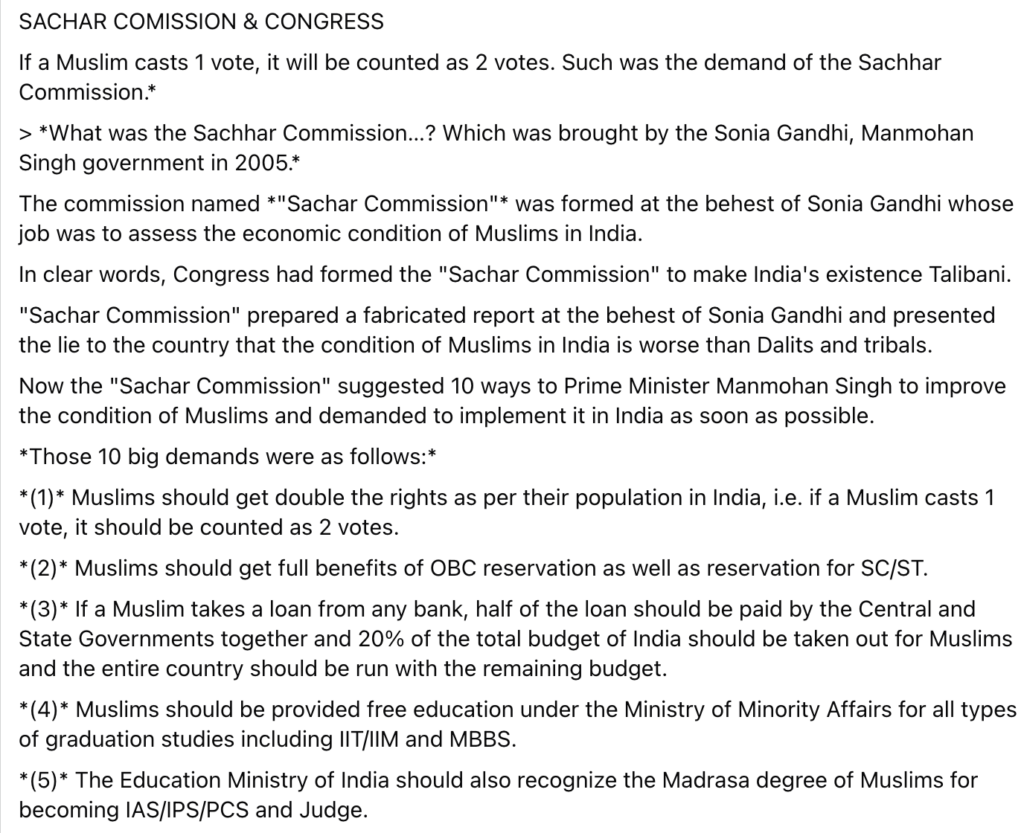
Archived post can be seen here
| Claim: The Sachar Committee’s recommendations include granting double voting rights to Muslims and reserving 30% of parliamentary seats and 40% of legislative assembly seats for Muslims etc. Fact: The majority of the claims in the viral post are false or misinterpreted. The Sachar Committee did not recommend double voting rights, debt-free loans, or enormous reservations for Muslims. Instead, it advocates for policies aimed at improving the socio-economic conditions of Muslims through educational reforms, financial inclusion, improved political representation, and social welfare, among other measures. Hence the claim made in the post is FALSE. |
The Sachar Committee was a seven-member high-level committee established in March 2005 by former Indian Prime Minister Manmohan Singh. Chaired by former Chief Justice of the Delhi High Court, Rajinder Sachar, the committee was tasked with studying the social, economic, and educational conditions of Muslims in India. The committee submitted its report in 2006. Titled ‘Social, Economic, and Educational Status of the Muslim Community of India’, the report included recommendations, suggestions, and solutions aimed at fostering the inclusive development of Muslims in India. The Committee’s report, along with its 76 recommendations is publicly available on the Ministry of Minority Affairs’ website. Let’s verify each of the claims made in the viral post.
Claim 1: Double voting rights for Muslims
The Sachar Committee Report does not propose any changes to voting rights for Muslims or any other group. The report operates within the framework of the Indian Constitution, which ensures one person, one vote for all citizens, regardless of religion, caste, or gender. The committee highlights the issue of missing Muslim names in the voter list, which disempowers them.

Claim 2: Muslims should get reservation benefits on par with SC/ST and OBCs
The Sachar Committee Report does not recommend blanket reservation benefits for all Muslims on par with Scheduled Castes (SC) and Scheduled Tribes (ST), but it does advocate for including disadvantaged Muslim groups under the Other Backward Classes (OBC) category. It highlights that many Muslims, particularly Ajlafs and Arzals, are already socio-economically comparable to Hindu OBCs and should benefit from reservations. The report points out the exclusion of Arzal Muslims from SC reservations due to the Presidential Order of 1950 and suggests considering them for inclusion in SC or a Most Backward Classes (MBC) category under OBC. State models like those of Kerala and Karnataka, where reservations or sub-quotas for Muslims are implemented, are cited as successful examples of affirmative action tailored to specific needs.

Claim 3: Writing off 50% of loans and allocating 20% of the budget for Muslims
The claim that the government should pay half of a Muslim’s bank loan and reserve 20% of India’s total budget for Muslims is false and unsupported by the Sachar Committee Report. The report highlights limited access to institutional credit for Muslims and recommends increasing financial inclusion by improving banking infrastructure and ensuring fair distribution of priority sector loans but it does not suggest any loan repayment by the government. Similarly, the report emphasises equitable resource allocation for marginalised communities, including Muslims, particularly in education, healthcare, and infrastructure but it does not propose reserving a fixed percentage of the national budget exclusively for Muslims.
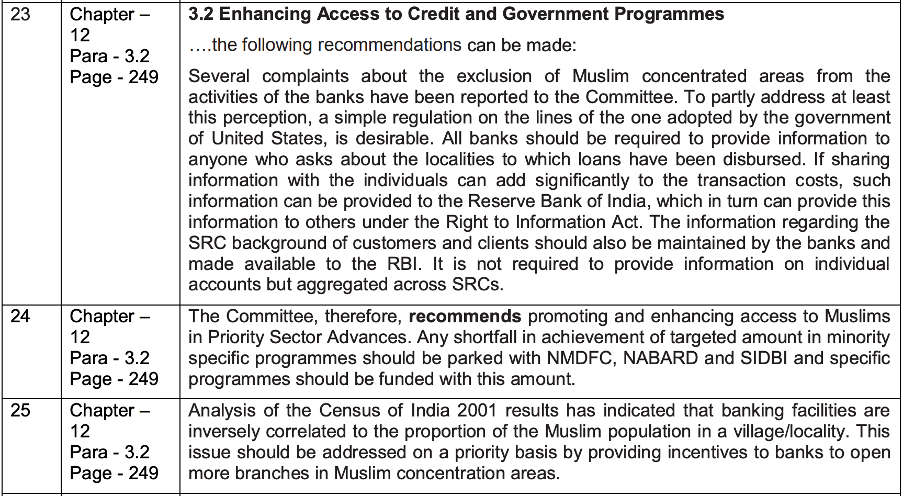
Claim 4: Free education for Muslims for all undergraduate courses at premier institutions
The claim that Muslims should receive free education for all graduation courses, including MBBS, at premier institutions like IITs, and IIMs, is a misrepresentation of the report’s intent and recommendations. The report focuses on addressing the educational backwardness of the Muslim community by recommending targeted interventions such as increasing scholarships, providing financial aid for economically disadvantaged students, and improving access to quality education. It emphasises creating an enabling environment by reducing dropout rates, establishing more schools and colleges in Muslim-majority areas, and integrating Madarsa education with mainstream curricula. While it advocates for affordability and accessibility in education, it does not propose free education for all Muslims at premier institutions or otherwise. Moreover, The Sachar Committee Report advocates for free and compulsory education for all children, including Muslims, as part of a broader national goal to improve literacy and reduce dropout rates, in line with India’s constitutional framework and policies like the Right to Education Act.
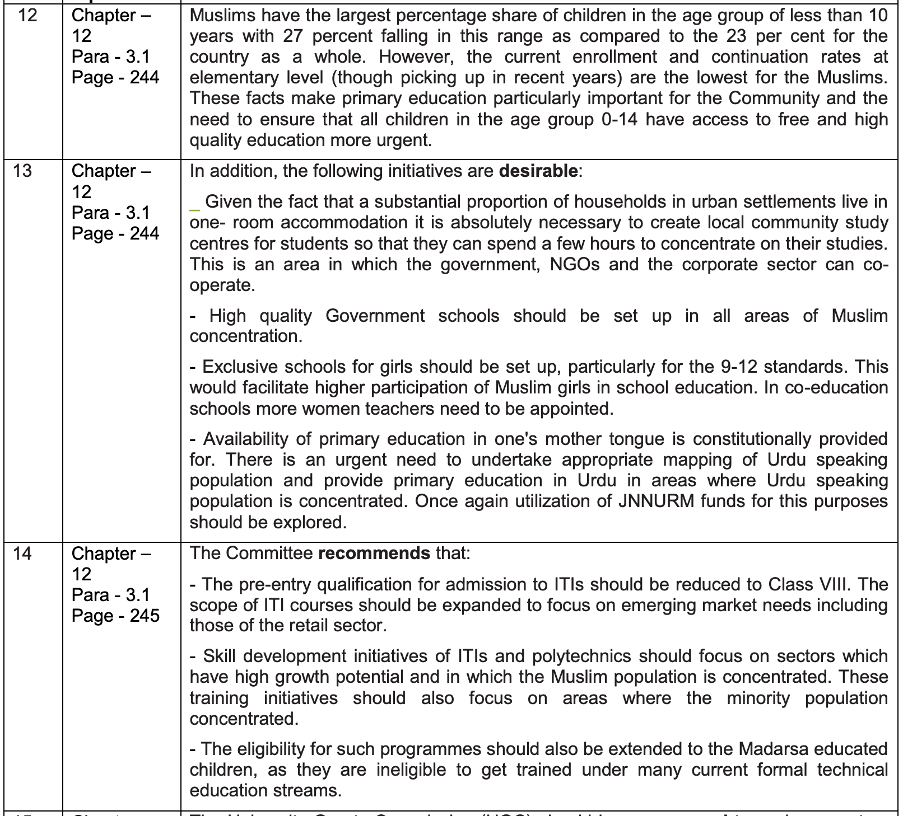
Claim 5: Recognition of Madarsa degrees for eligibility in competitive examinations
Recommendation No. 22 of the Sachar Committee Report advocates for the modernisation of Madarsa education by introducing subjects like science, mathematics, and English alongside religious studies to improve the overall quality of education. It emphasises integrating Madarsas into the mainstream education system by recognising their degrees as equivalent to regular school qualifications. It also recommends recognition of the degrees from Madarsas for eligibility in competitive examinations such as the Civil Services, Banks, Defence Services and other such examinations.
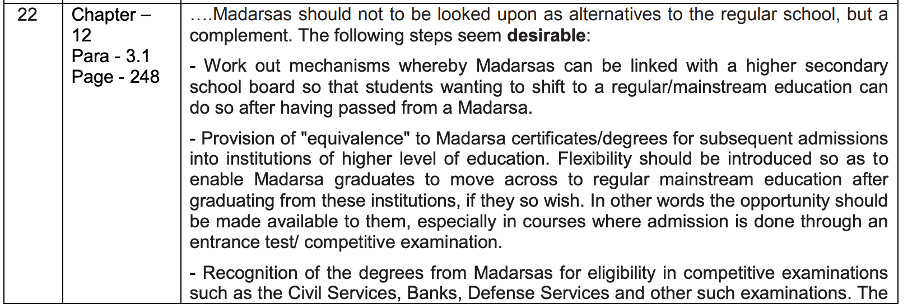
Claim 6: Reserving 30% of MP seats and 40% of MLA seats for Muslims
The Committee Report does not recommend reserving 30% of the seats for MPs and 40% of the seats for MLAs for Muslims. The report does discuss the underrepresentation of Muslims in political spaces and calls for measures to improve their participation, including more rational delimitation of constituencies, which ensures Muslim-majority constituencies are not reserved for Scheduled Castes (SCs), limiting Muslim representation. The committee also emphasises the importance of ensuring nomination procedures to increase Muslim participation at local levels. However, the report does not propose any specific quotas for Muslims in Parliament or State Assemblies on the scale mentioned in the claim.
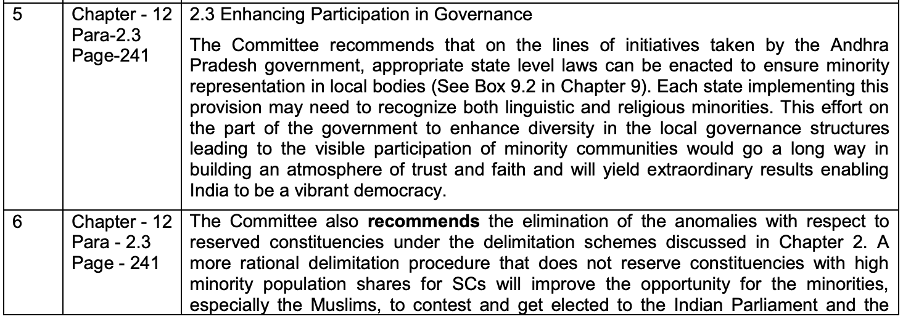
Claim 7: Reserving 50% of the seats in boards, institutions, and government jobs for Muslims
The Committee Report does not recommend reserving 50% of the seats in boards, institutions, and government jobs for Muslims. However, it does emphasise improving Muslim participation in various sectors, particularly in public-facing roles such as teaching, health, police, and banking. Recommendation No.28 suggests efforts to increase Muslim representation, especially in positions with public contact. The report advocates for greater inclusion through measures like more transparent recruitment processes and creating a visible recruitment process in Muslim-majority areas to build trust and confidence. It also suggests that employers should be encouraged to become equal-opportunity institutions to increase Muslim representation in government jobs and public services.
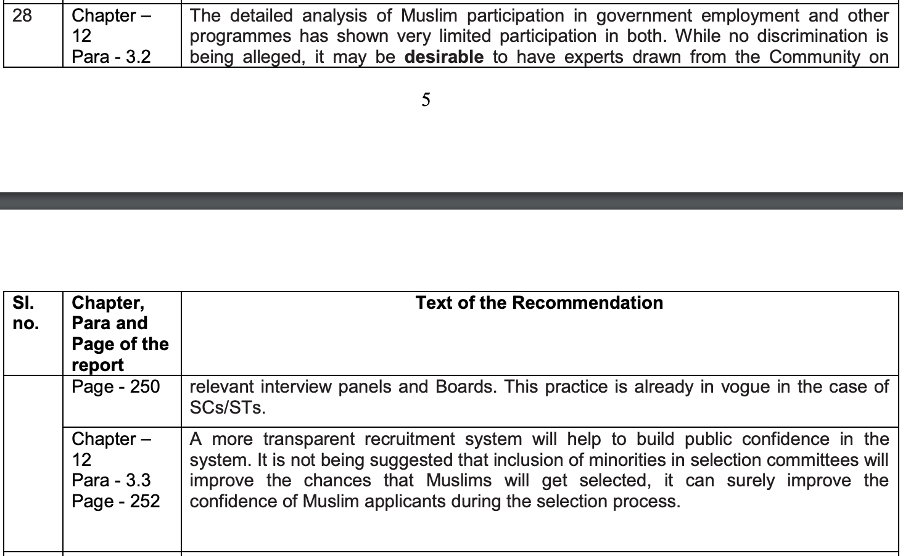
Claim 8: Special industrial zones for Muslims with free electricity and land
The Committee Report does not specifically recommend the creation of special industrial zones for Muslims or provide free electricity, free land, and debt-free loans. However, the report does emphasise the need for enhanced access to credit for Muslims, especially for self-employed individuals and small businesses. It highlights the limited access to financial resources, particularly in Muslim-majority areas, and calls for better participation in micro-credit schemes and entrepreneurial development programs through institutions like NABARD and SIDBI. The report also suggests incentivising banks to open more branches in Muslim-populated areas and addressing discrimination in loan disbursal, but it does not propose extreme measures of debt-free loans or special industrial zones.
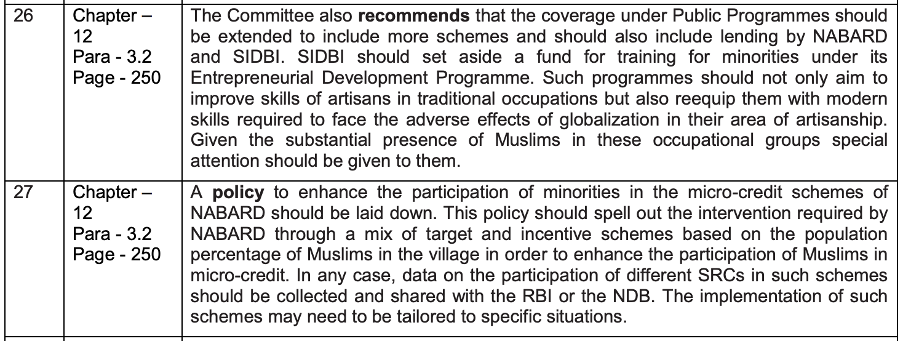
Claim 9: Government subsidy for the marriage of Muslim women
The Sachar Committee Report does not specifically recommend providing Rs 5 lakhs for the marriage of Muslim women or Rs 10 lakhs for Muslim boys to start their businesses. Instead, the report focuses on improving access to credit, financial inclusion, and entrepreneurship for marginalised Muslim communities. It highlights the need for targeted support in the form of micro-credit programs, particularly for self-employed individuals and small businesses, and advocates for improving access to bank credit and skill development for Muslims. The report also discusses the inadequate participation of Muslims in government schemes and the challenges in accessing financial resources, calling for better targeting and more inclusive financial policies.
Claim 10: Reservation based on 25% Muslim population in elections
The Committee Report does not recommend that any village, town, city, or district with more than 25% Muslim population should have reservations exclusively for Muslims to contest elections. However, the report does address the issue of the underrepresentation of Muslims in political spaces, particularly in constituencies that are reserved for Scheduled Castes (SCs), despite having a significant Muslim population. The committee suggests that rational delimitation procedures should be implemented to prevent constituencies with a high minority population, especially Muslims, from being designated as reserved for SC candidates. This would enhance the opportunity for minorities, particularly Muslims, to contest and be elected, thereby improving their political representation.

In February 2014, the UPA government stated that it had accepted 72 out of 76 recommendations made by the Sachar Committee and that it had made 43 decisions to implement them. In 2018, the NDA government also released a list of schemes, programs, and decisions that were implemented in the country based on these 72 accepted recommendations of the Sachar Committee report.
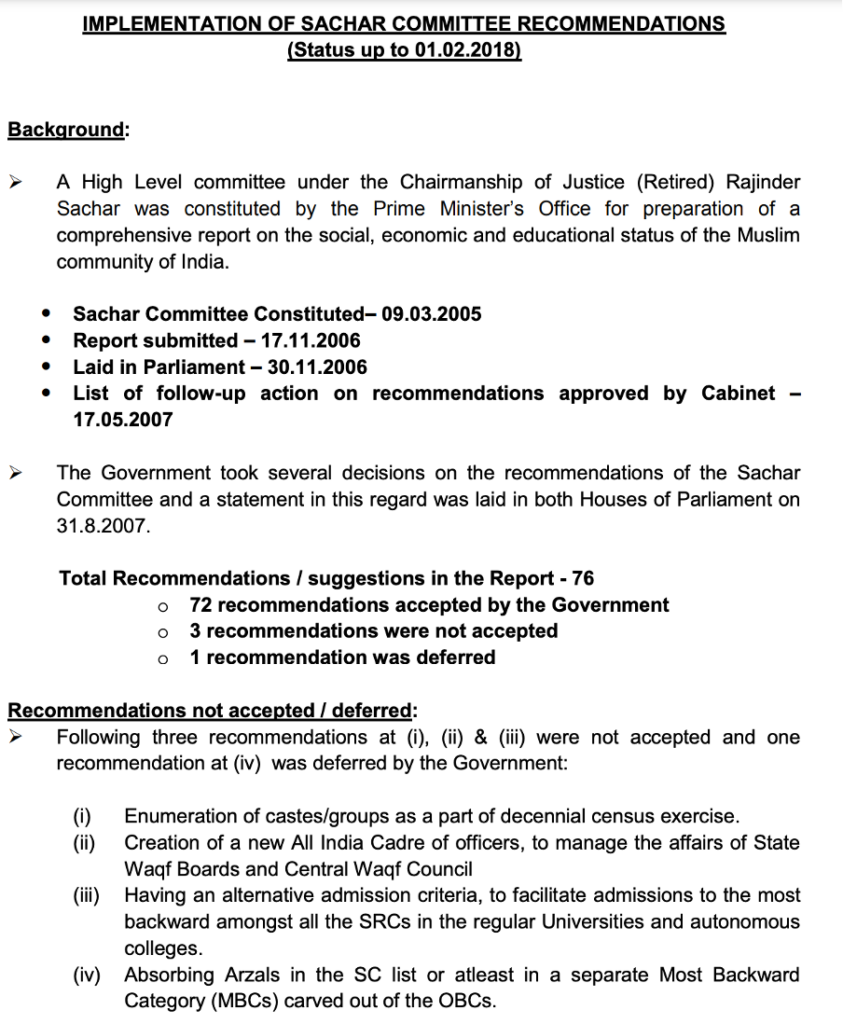
To sum it up, the Sachar Committee Report does not endorse the extreme claims circulating on social media. While it advocates for policies to improve the socio-economic conditions of Muslims, including affirmative action and financial inclusion, it does not propose the drastic measures suggested in these viral claims.
Disclaimer: This story was originally published by Factly, as part of the Shakti Collective. Except for the headline and excerpt, this story has not been edited by ABP Live staff.





























